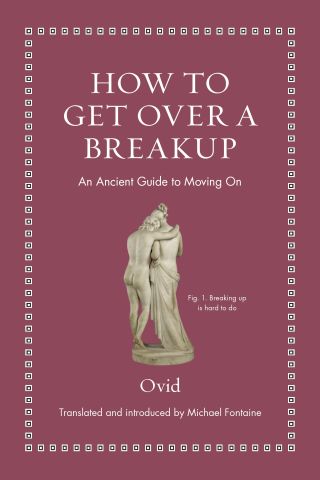Shame
Is Body Shaming an Ex a Good Idea? A View From Ancient Rome
Unblinding ourselves doesn’t have to result in cruelty, though some say it does.
Posted July 25, 2024 Reviewed by Margaret Foley
Key points
- If minimizing someone's flaws helps us fall in love, will exaggerating them reverse that process?
- While Ovid's writings suggest this, maybe he wasn't completely serious about all 38 of his remedies for love.
- Much of his poem may be a mockery, rather than an example, of psychotherapy.

This post is the fourth in a series based on my new book, How to Get Over a Breakup: An Ancient Guide to Moving On. See 1, 2, and 3.
It’s no secret that love is blind. The adage exists in every European language and it’s been around forever. Plato said it. Cicero said it. And the Middle Ages gave it a memorable spin by turning it into a little verse:
Caecat amor mentes ac interdum sapientes.
(Love blinds minds, and sometimes even the wisest among us.)
But no one said it better than a forgotten Roman philosopher named Lucretius.
Lucretius was a poet and apostle for the popular ancient philosophy known as Epicureanism. He lived in Rome a couple of generations before Ovid, but because his philosophy preached the mantra "live unnoticed" (in Greek, láthe bíosas), we know nothing about him.
Alas, the mantra worked all too well!
Even so, it's clear Lucretius was an odd fellow. He wrote a huge epic poem on Epicureanism titled The Nature of Things, and in it he writes (4.1152-9, tr. Stallings 2007),
Desire makes men blind—
and generally they overlook their girlfriends’ faults, and bless
these women with fine qualities they don’t in fact possess.
That’s how it comes that we see girls— malformed in many ways,
and hideous—are petted darlings, objects of high praise.
Indeed, one lover often urges another he would mock:
“Venus has it out for you—your love’s a laughing stock.”
(Poor fool—that his delusion’s worse would come as quite a shock!)
Of course, that cuts both ways. Women are just as liable to idealize us men when they get a crush on us.
In fact, love blindness seems to be hardwired in us. Evolutionary psychologists probably have thoughts about that, but we don't need to know where it comes from to recognize that the phenomenon is real.
And as Lucretius notes, we’ll rationalize and euphemize just about any flaw or objection away. When we're in love, reality checks bounce off us like bullets from Superman's chest.
Lucretius himself makes this point in the next lines (1160–70):
The black girl is brown sugar. A slob that doesn’t bathe or clean
Is a Natural Beauty; Athena if her eyes are greyish-green.
A stringy bean-pole’s a gazelle. A midget is a sprite,
Cute as a button. She’s a knockout if she’s giant’s height.
The speech-impaired has a charming lithp; if she can’t talk at all
She’s shy. The sharp-tongued shrew is spunky, a little fireball.
If she’s too skin-and-bones to live, she’s a slip of a girl, if she
Is sickly, she’s just delicate, though half dead from TB.
Obese, with massive breasts?—a goddess of fertility!
Snub-nosed is pert, fat lips are pouts begging to be kissed—
And other delusions of this kind too numerous to list.
(It's tempting to edit some of this out, by the way, but that's what Lucretius wrote so I've left it all in.)
Now, 2,000 years ago our poet-and-love-counselor Ovid (pronounced Áh-vid) read this very same passage and it set his mind whirring. Because remember, Ovid was on a mission to help us get over unrequited love. So if blindness helps us fall in love, he reasoned, then tearing the blindfold off and forcing our eyes to the light ought to neutralize that process. Right?
But hey, what if you go one better and disparage the former object of your affections—if you humiliate and body shame her? Doing that should actually reverse the process. Right?
So concluded Ovid, anyway, and that gives rise to the ninth of his 38 remedies for love:
Minimize and belittle your ex’s best features.
In plain English, says Ovid, tell yourself your ex is nowhere near as attractive or talented as you thought—especially if it’s not true.
Ovid then gives us some examples, and if you read them carefully you'll see he's borrowed many from Lucretius:
- If she’s curvaceous, then call her enlarged.
- Say she’s dark if she’s tawny.
- Starving can be an insult when a girl’s slender and fit.
- Brash is the thing to call a girl who isn’t just mousy.
- Mousy is the thing to call one who is actually sweet.
Now, philosophers in every age pride themselves on “seeing things as they really are” and “calling things by their true names”—no hypocrisy for them! It's the sign of a clear-thinker. A guru.
But this isn't that. We aren't calling a spade a spade and a flaw a flaw. Ovid wants us to belittle the other person. To humiliate him or her.
And don't just stop at names, says Ovid. Go further. Shame your ex so you can get a good, hard look at her flaws. So, he says,
Whatever talent your ex is lacking, nag her to show it off (always with flattering words):
- Urge her to sing if the woman that you’re with has a voice that’s no good, or
- get her to dance if she is clueless about how to move her arms.
- Can’t speak Latin correctly? Engage her in long conversations.
- Doesn’t know how to play chords? Have someone bring her a lyre.
- Walks all weird? Then go for a walk.
- Her breasts are all over, filling her chest? It’s a flaw; ask her to not wear a bra.
- Teeth in bad shape? Then tell her a story or joke. Get her laughing.
- Overemotional, cries? Share some sad news. Make her sob.

Everyone reading this tends to feel that Ovid has crossed a line. We’ve gone from self-help to sadism, from psychotherapy to psychotic bullying.
Because dispelling our illusions doesn’t have to mean going from one extreme to the other. That's a mistake. Unblinding our eyes to flaws doesn’t have to mean exaggerating those flaws and demonizing the other person.
So it’s worth asking ourselves how seriously Ovid means this (and, by extension, all his other 38 "remedies for love"). Maybe Ovid really means it, and he really does think bullying and body shaming a girlfriend or boyfriend is the way to assert your independence and move on.
But maybe he doesn't. And if he doesn't, could it be that he's actually trolling Lucretius and other such life coaches and gurus and all their kooky bro-science approach to love?
We can’t answer that question conclusively, but my next post will show why it's a good guess.
References
Buchheit, Vinzenz. 1964. “Amor caecus.” Classica et Mediaevalia 25:129-137.
Fontaine, Michael (translator). 2024. Ovid: How to Get Over a Breakup.: An Ancient Guide for Moving On. Princeton University Press.
Stallings, A.E. (translator). 2007. Lucretius. The Nature of Things. Penguin Books.




